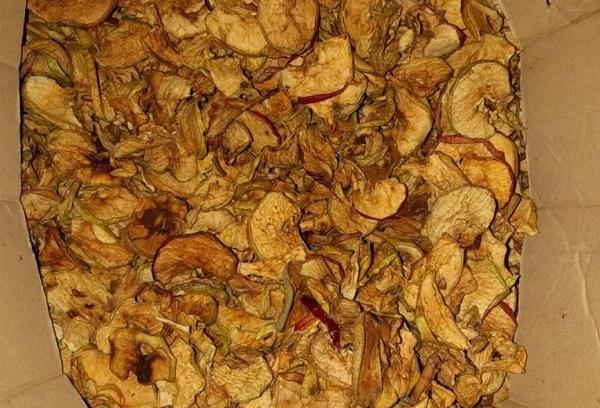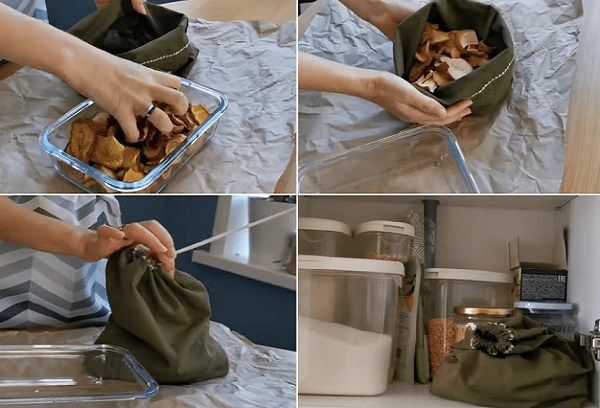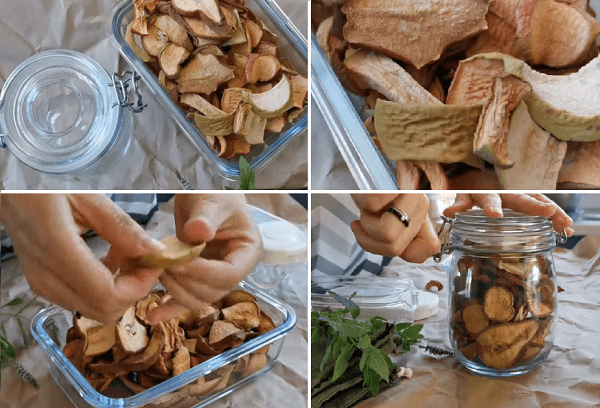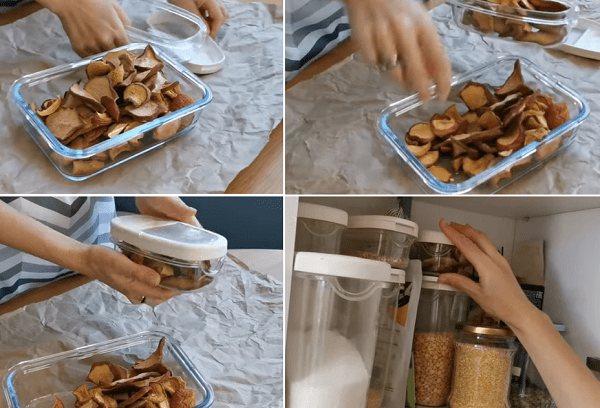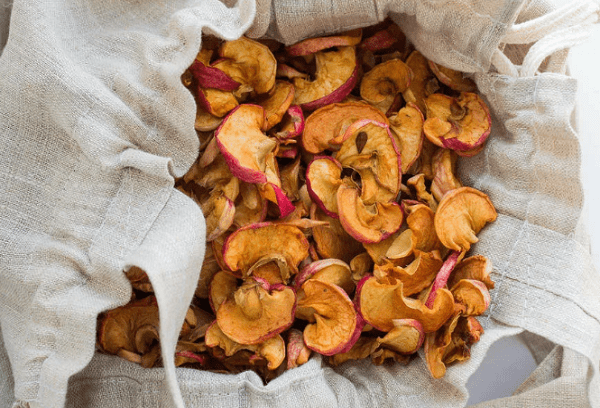7 rules for storing dried apples will help preserve the taste for a long time - old-fashioned secrets of protecting drying from moths
Content:
- About shelf life: fragrant apples 3 years after drying, is it realistic?
- Rule No. 1 – Comply with storage conditions
- Rule #2 – Store dried apples in suitable containers
- Rule No. 3 – Pack dried apples tightly
- Rule #4 – Use paper
- Rule No. 5 – Choose a suitable place in the apartment or house
- Rule No. 6 – Avoid harmful neighborhoods
- Rule #7 – Check inventory every 1-3 months
- Questions and answers
With a large harvest of vegetables and fruits, a caring housewife makes preparations for the winter, trying to preserve all their benefits, aroma and taste. Up to 97% of vitamins remain in dried apples, while it takes up minimal space in the pantry. Storing dried apples at home is easy. You need to follow 7 simple rules. The correct approach to drying storage will protect it from moths, mold, and loss of taste.
About shelf life: fragrant apples 3 years after drying, is it realistic?
According to GOST 32896-2014 “Dried fruits. General technical conditions", the shelf life of dried fruits is 12 months. But in reality, dried apples can be stored much longer - 3.4, sometimes 5 years. It all depends on the variety of apples, harvesting method and storage conditions.
- It is recommended to store apples dried at home in the sun or in the oven for 12 months;
- Dried apples prepared using an electric dryer and packaged in hermetically sealed glass jars can be stored for 24-36 months.
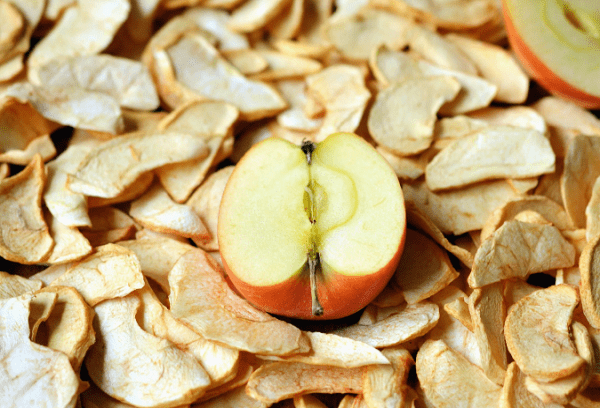
Rule No. 1 – Comply with storage conditions
The first thing the housewife should take into account is that only clean, well-dried apples are suitable for long-term storage. They cannot show signs of mold. It is important that the dried apple ring remains elastic and soft, but that no juice is released when squeezed. This drying will be stored well if you follow the storage conditions:
- dry, ventilated room;
- protection from direct sunlight;
- temperature +0+10 degrees;
- clean and dry storage containers;
- no contact with fresh vegetables, fruits, household chemicals.
Rule #2 – Store dried apples in suitable containers
For dried apples, it is not necessary to use airtight storage containers such as vacuum bags, glass jars, etc. In some cases, sealing can even be harmful. It is much more important to pay attention to cleaning the container. There should be no dirt, debris, or plaque on the walls. All this can cause the development of putrefactive processes and spoilage of the product.
In cardboard boxes
Cardboard boxes with a lid are suitable for storing dried apples. The main condition is that the lid must close tightly so that insects do not get inside through the cracks.
Cardboard containers absorb moisture and reduce the risk of dried apples becoming moldy.
It preserves better apples dried at home in the sun or in the oven. As a rule, such drying dries unevenly, and in a sealed space it quickly begins to deteriorate.
In fabric bags
Storing dried apples in bags is an old ancestral method that is still used in villages to this day. You can sew the bags yourself from thick cotton fabric or use an old pillowcase for storage. But the best linen fabric for storing dried fruits is considered to be a tightly woven linen fabric.
Fabric bags allow air to pass through well, so dried apples in them never become moldy.
But at the same time, small bugs and moths can penetrate inside. The bags must be tied. In villages, to keep them dry from insects, rag bags are soaked in a strong salt solution (1 kg of coarse salt per 5 liters of water). The bags are soaked for 8 hours and then dried well in the sun.
In glass jars
Glass containers are considered the most hygienic. Dried apples can be stored in a jar for as long as possible without loss of aroma and taste. In addition, insects cannot get into a tightly sealed glass jar. Foreign odors, moisture and oxygen do not penetrate into it. The smell of apples does not disappear even after 3-4 years.
It is true that only well-dried and clean dried fruits can be stored in a jar. Otherwise, the lack of air and natural ventilation will play a cruel joke, and the remaining moisture will lead to rapid molding of the workpiece.
Note. Typically, apples dried in a dehydrator (electric dryer) are stored in glass jars. In it, the fruits are dried more efficiently and evenly.
In plastic containers
Plastic trays are almost as good for storing dried apples as glass jars. They do not allow air, moisture, odors to pass through, and are also much stronger and lighter. You don’t have to worry that the drying container will fall and break.The downside is that the plastic itself can be a source of unpleasant odors.
To store dried apples, you should use containers made exclusively from food-grade plastic with appropriate markings.
It is best to purchase a new container. Over time, plastic products become covered with scratches, which retain bacteria. They can absorb food odors. Dried apples cannot be stored in such containers.
Rule No. 3 – Pack dried apples tightly
A number of dried fruits (for example, dried apricots, raisins, figs) require a small air gap for better preservation. Dried apples, on the contrary, should be placed very tightly in a jar or box. Firstly, they take up less space. Secondly, the less dried apples come into contact with air, the stronger and longer they smell and retain their benefits and taste.
Rule #4 – Use paper
The bottom of the jar, plastic container or fabric bag in which you plan to store dried apples must be covered with parchment.
Parchment paper protects products from unpleasant odors, reduces the negative effects of temperature changes, high humidity, etc.
If you don't have parchment, you can use other clean, thick paper, such as office paper. It is important to avoid contact of products with newspapers and other printed materials containing printing ink.
Rule No. 5 – Choose a suitable place in the apartment or house
It is best to store dried apples in an apartment or house in a cool pantry.
It is dark and quite dry here, there are no heating devices, which are contraindicated for dried fruits. If the dryer is in a bag or cardboard box, it is important not to place it on the floor. You need to allocate space for it on the shelf, or use a stand.
Other places that are suitable for storing dried apples at home:
- basement or cellar (for drying apples in plastic trays and jars);
- kitchen table drawer, remote from heating appliances and piping;
- insulated balcony or loggia.
Advice. If dried apples are placed on the balcony in a transparent container, you should come up with a sun curtain for them. If exposed to direct sunlight, the dryer may darken and disappear quickly.
Rule No. 6 – Avoid harmful neighborhoods
Dried apples absorb odors very quickly.
It is enough to stand them next to spices, onions or other products for one day so that the pleasant aroma of apples is distorted beyond recognition. All bright-smelling products are considered harmful for apple drying. Among them:
- citrus fruit;
- bananas;
- cabbage;
- potato;
- garlic and onion;
- herbs.
You should also remember that the main source of moths and bugs are cereals, flour and pasta. If the housewife is not sure of their purity, the products should be kept in quarantine for some time, separately from dried apples.
Note. This rule applies to drying materials stored in boxes and fabric bags.
For dried apples in boxes and bags, storage in cellars, garages and basements is generally not recommended. It is better to place supplies in the pantry among preserved food in jars or on a glassed-in loggia.
Rule #7 – Check inventory every 1-3 months
It is very rare that stocks of dried apples spoil in one day. In most cases this happens slowly. An efficient housewife has every chance of saving the workpiece if she checks and sorts out the drying from time to time. It is best to do this monthly, for example, on the 1st, or, at worst, once every 3 months.
It is especially important to check dried apples that have been dried in the oven or in the sun and that have been recently harvested.
Questions and answers
What to do if there are moths in dried apples?
If the moth has not managed to ruin the entire drying, you can sort it out. Dried apples, clean of cobwebs and larvae, should be heated in the oven at 75 degrees for 20-30 minutes. An electric dryer can be used for the same purposes.
What to put in a jar of dried apples to repel insects?
Moths do not like the smell of fresh garlic, lavender, pine needles, and citrus fruits. However, strong odors are also harmful to dried fruits. Instead, housewives use the following life hack to protect supplies: before drying, apple slices are washed in lightly salted water and then soaked for 10 minutes in a vinegar solution (100 ml of 9% vinegar per 1000 ml of water). After this, the apples are dried as usual. Vinegar quickly disappears, dried fruits also smell pleasant and have the same taste. But for moths they become inedible.
It is very sad and disappointing to find moths or other bugs swarming around in the stocks of fruits that the housewife has lovingly cut, dried under the summer sun, or carefully laid out on electric dryer trays. To prevent this from happening, and to prevent the dried apples from spoiling, you must adhere to the rules described above. Proper drying of fruits and proper storage guarantee a wonderful aroma, excellent taste and benefits of dried apples for many years.
